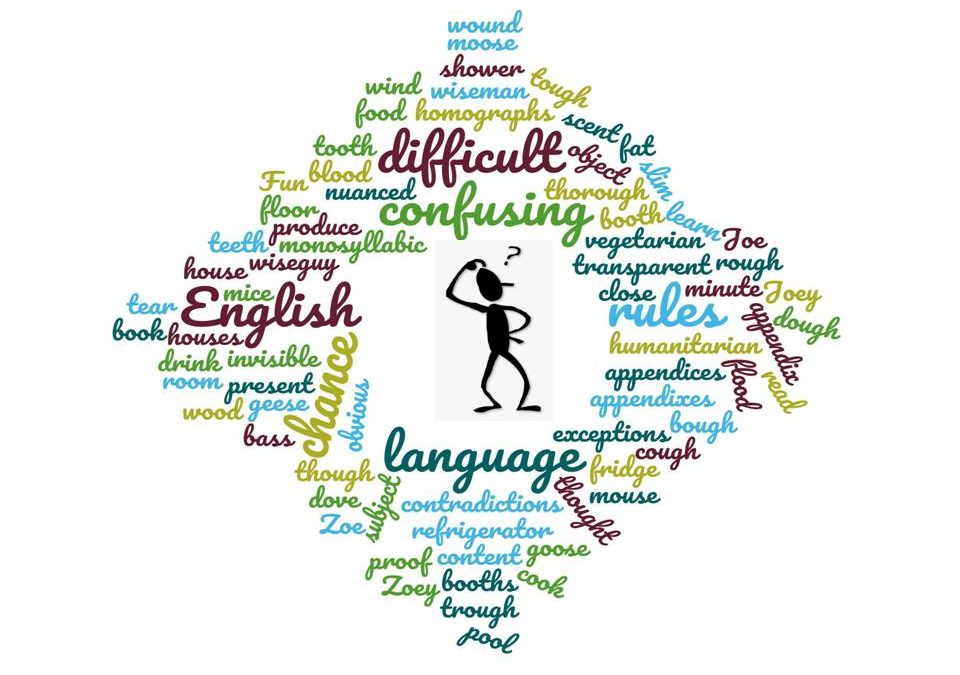Some people say that English is one of the most difficult languages to learn. If English is your first language, you probably don’t think so. But those who learned English as a second or third language would likely disagree. My associate Ramona Rea (@RamonaRea), who proofreads my blogs, recently commented on how nuanced English is, and how often those of us for whom English is our first language use the right terms or pronunciations without even thinking about it.
All languages have their own unique idioms and word pronunciations that vary geographically. Many languages have a series of rules to follow for correct grammar. Those rules may be extensive and complicated and require a lot of learning up front, but once you’ve learned them, you feel like you can converse well 90 to 95% of the time. I’ve studied German, French, and Spanish, and that was the case with each of them. There’s always a need to learn more vocabulary, but if you know the rules, you’re pretty much good to go.
When a grammar and spelling enthusiast such as me starts to explore the nuances of the English language, I get a greater appreciation for all of the exceptions to the rules. It seems like there are more exceptions than rules. How is anyone ever supposed to learn and remember all of them?
Let’s have some fun with the many contradictions in the English language.
How do you pronounce words ending in “ough”? Is it “off” or “uff” or “oh” or “ew”?
Cough
Bough
Rough
Dough
Through
Though
Thought
Thorough
Tough
Trough
How do you pronounce “oo” in a word? Is it “ew”, “uh”, or “oh”?
Proof
Blood
Wood
Floor
Flood
Food
Room
Cook
Pool
Book
Plurals can be challenging as well:
One goose, two geese. But one moose, two moose.
One mouse, two mice. But one house, two houses.
One tooth, many teeth. One booth, many booths.
One appendix, two appendices (in books only), or two appendixes (in bodies or books).
You probably know the rule of “I before E except after C,” such as in receive, ceiling, receipt and perceive. But here’s an exception, when you run a feisty heist on a weird, beige, foreign neighbour. Or when you plan to do science on a glacier.
Many words can be pronounced different ways, where each pronunciation has a different meaning. These are called homographs:
The bandage was wound around his leg to cover his wound.
It’s time to present her the present.
Startled, the dove dove into the bushes.
When does are near, a buck does funny things.
She shed a tear when she saw the tear in the curtains.
A large-mouthed bass was painted on the head of the bass drum.
I did not object to the object.
The teacher had to subject the subject to a test.
I need to read what I read again.
We were too close to the door to close it.
The wind was too strong to wind the sail.
The farm was used to produce produce.
A minute is 60 seconds, but something minute is very tiny.
I’m not content with this content.
Other questions:
Why does “fridge” have a D in it, but “refrigerator” does not?
Why are “Zoey” and “Zoe” pronounced the same, but “Joey” and “Joe” aren’t?
Why is it that you can drink a drink, but you can’t food a food?
If a vegetarian eats vegetables, what does a humanitarian eat?
If “read” is the past tense of “read”, then why is “led” the past tense of “lead”?
Why are a slim chance and a fat chance the same thing?
How can transparent be both invisible and obvious?
Is the S or C in “scent” silent?
Why are boxing rings square?
Why does an alarm go off when it’s on?
Why is a wise man the opposite of a wise guy?
Why is a bag man holding all the money while a bag lady is poor?
Why does the word monosyllabic have five syllables?
Why are taking a shower and giving a shower two very different showers?
Yes, it seems that English can be a confusingly difficult language to learn. Luckily, people like me who enjoy obsessing about getting the text “just right” are available to help those who struggle with the language or don’t have the time to double- and triple-check everything.
I look forward to receiving your feedback, and I welcome suggestions for future weekly writing tips.



Great to read! I’ve been on hiatus for a while, but hope to get back to writing new blogs soon.
“I am going to go ahead and save this content” should be, I am going to save this content.